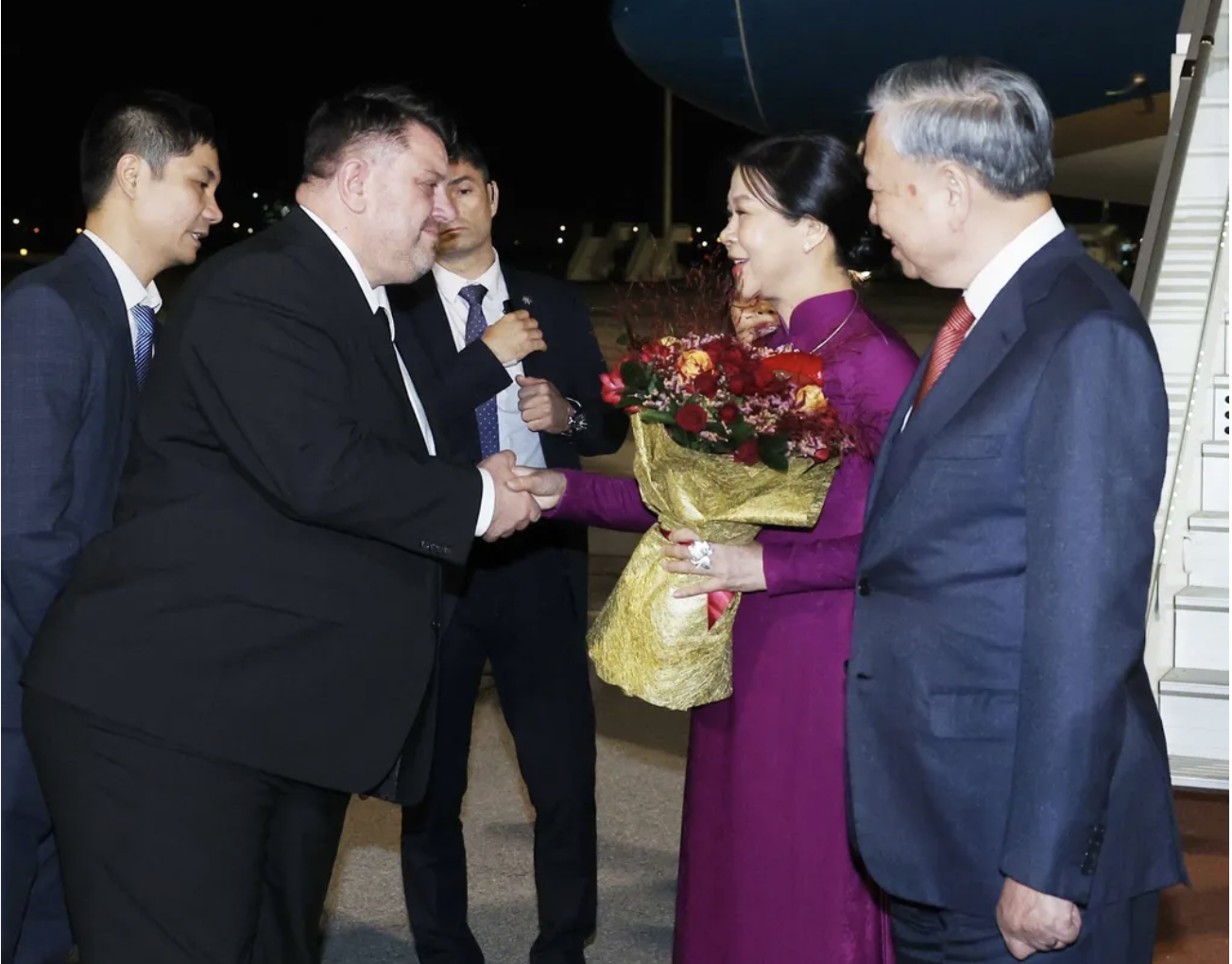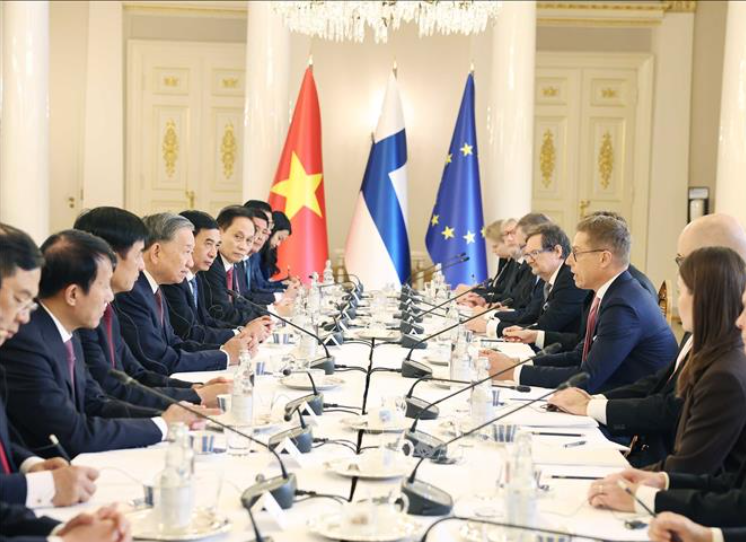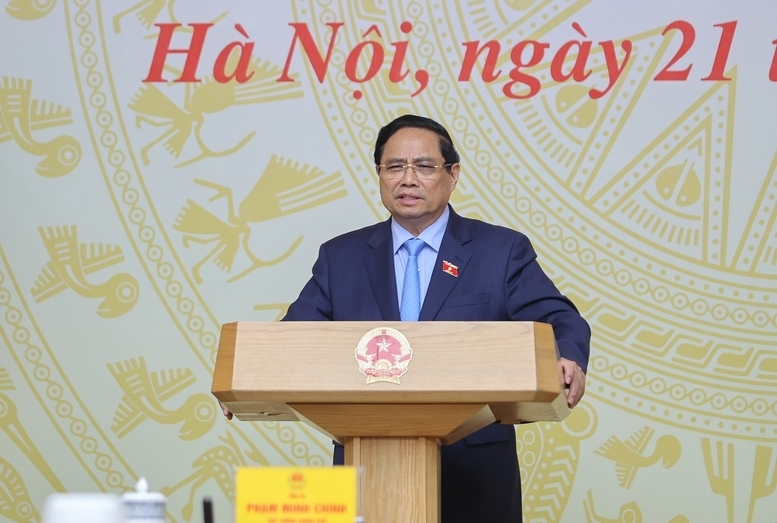
Party General Secretary To Lam and his spouse begin official visit to Bulgaria
19:05 | 23/03/2025 16:50 | 23/10/2025News and Events
On the afternoon of September 30 in Hanoi, the Ministry of Industry and Trade (MoIT) held a dialogue to gather input from experts, regulators, businesses and relevant energy sector stakeholders on the implementation of a competitive electricity market. Minister Nguyen Hong Dien chaired the conference.
The event brought together leaders of departments and functional units under the Ministry, representatives of the National Power System and Market Operation Company Limited (NSMO), energy groups and enterprises, experts, regulators, business associations, universities and specialized agencies.

Minister Nguyen Hong Dien chaired the conference.
Accelerating the development of a competitive power market under Resolution 70
In his opening remarks, Minister Nguyen Hong Dien emphasized that Resolution No.70-NQ/TW of the Politburo on ensuring national energy security through 2030 with a vision to 2050 sets out clear objectives, tasks and solutions for developing a competitive electricity market, implementing a two-component electricity pricing mechanism and addressing cross-subsidization. He stressed that this requires the Government and the Ministry to lead the development and implementation of effective action programs and plans.
Over the past period, the MoIT has led the implementation of several key tasks in line with the roadmap for developing the competitive electricity market. In terms of institutional development, the Ministry has completed a large volume of work on drafting, promulgating and submitting legal documents to competent authorities.
Notably, the revised Electricity Law was drafted and finalized at record speed, within just nine months, and is set to be passed by the National Assembly in a single session. Alongside this, numerous decrees, Prime Ministerial decisions and ministerial circulars have been issued. The Power Development Plan VIII (PDP8) and its adjusted version have been finalized, providing a stable legal framework for the sector’s growth.
Regarding organizational structure, the Ministry has directed the separation of the National Load Dispatch Centre (A0) into the independent and transparent National Power System and Market Operation Company (NSMO), eliminating conflicts of interest with market participants.
In terms of market structure, there are now more than 140 power plants participating in price offers, five electricity distribution corporations and hundreds of retail companies, in addition to the Electricity Power Trading Company as the main wholesale buyer.
On operational infrastructure, the Ministry has instructed synchronized investment planning to ensure the power system can meet the new requirements associated with the market development roadmap. On electricity pricing reform, the Ministry has issued multiple retail price frameworks and flexible adjustment mechanisms, while also developing pricing frameworks for new types such as energy storage, pumped hydro and battery systems. These steps lay the groundwork for a more transparent and competitive electricity market in the coming years.
Despite significant progress, Minister Nguyen Hong Dien candidly acknowledged that Vietnam’s electricity market remains incomplete and faces numerous bottlenecks. These include difficulties and delays in investment attraction and price negotiations, non-transparent pricing mechanisms with persistent cross-subsidization between customer groups, and the absence of consumer choice of electricity suppliers.
He stressed that addressing these issues is essential to building a fair electricity market that drives energy development. The challenge is compounded by the fact that over the next five years, generation capacity must triple from 81,000 MW to between 234,000 and 251,000 MW, according to the adjusted PDP8 and Resolution No.70-NQ/TW. Without a well-functioning, transparent market, achieving this target will be extremely difficult.

An overview of the conference.
Competitive electricity market: An imperative, not an option
Minister Nguyen Hong Dien underscored that Resolution No.70-NQ/TW is an imperative of reality. “There is no room for hesitation; those who do not agree with the reforms must step aside,” he stated.
The resolution represents a revolutionary milestone, setting out bold and decisive objectives and solutions to ensure national energy security. It places a heavy responsibility on the Government and the MoIT to swiftly develop and implement an action plan.
In his concluding remarks, Minister Nguyen Hong Dien noted that after listening to reports from the Electricity Regulatory Authority, NSMO and 18 opinions from experts, managers and representatives of corporations and enterprises, there was a strong consensus that developing a competitive electricity market and reforming electricity pricing mechanisms is an objective, irreversible trend.
This is crucial to removing bottlenecks, unlocking energy development and meeting the country’s economic growth needs, particularly in view of the double-digit growth targets for the coming years.
He outlined several core principles. The development of a competitive electricity market must align with the Party and Government’s policies and directions, especially Resolution No.70-NQ/TW, while consistently applying the principles enshrined in the Electricity Law.
Transparency, equality and fair competition without discrimination must be guaranteed for all market participants. The legitimate rights and interests of both power entities and consumers must be protected. Freedom of choice regarding trading partners and transaction methods must be respected, in line with the development level of the competitive market.
The development roadmap must suit Vietnam’s power sector conditions, based on a fully established, unified and synchronized legal framework. He also stressed the need for power sector restructuring to enhance competition while safeguarding energy security and social welfare; improving electricity pricing mechanisms and power purchase contracts; and investing in infrastructure and human resources to meet operational requirements.
During the discussions, participants agreed on the importance of continuing to review and amend the Electricity Law to address current obstacles to market development, while refining the design of both wholesale and retail competitive markets.
Minister Nguyen Hong Dien emphasized the need to phase out cross-subsidies between customer groups and regions, introduce cost-reflective distribution service pricing, and implement mechanisms for primary fuel management, especially for gas and blended gas pricing, to ensure efficiency and energy security.
He stated, “Institutional frameworks must be opened up, and all bottlenecks in each stage of the power sector must be addressed. As many experts have suggested, we should boldly eliminate the investment policy approval requirement for projects already included in the master plan, in order to streamline procedures, accelerate progress and unlock social capital.”
Minister Nguyen Hong Dien also assigned specific tasks to relevant units. The Electricity Regulatory Authority will act as the focal point to advise and implement plans ensuring the effective operation of competitive wholesale and retail electricity markets.
The Ministry must swiftly finalize the draft National Assembly Resolution on energy development mechanisms and policies for 2026-2030, concretizing Resolution No. 70-NQ/TW and the revised Electricity Law. A new decision replacing Decision No. 63/2013/QD-TTg on market operation principles and power sector structure must be submitted to the Government by December 2025.
The Oil, Gas and Coal Department must finalize the draft action program for Resolution 70 implementation, including proposals on gas pricing mechanisms in cooperation with PVN. The Legal Department must support the development of legal documents, while NSMO coordinates closely in market design evaluation and regulation development. Major state-owned enterprises including EVN, PVN and TKV must actively cooperate, even seconding technical personnel to assist in completing this significant workload.
The Minister concluded that decisive implementation of the measures discussed will be key to ensuring power security through 2030 with a vision to 2045. He emphasized that the most critical task is to develop a sound institutional framework and a healthy, competitive electricity market under state regulation and oversight. Without a fair, transparent and well-functioning market, attracting investors will be extremely challenging, as no one will commit large capital if the returns are uncertain.

19:05 | 23/03/2025 16:50 | 23/10/2025News and Events

19:05 | 23/03/2025 10:42 | 23/10/2025News and Events

19:05 | 23/03/2025 22:08 | 22/10/2025Economy

19:05 | 23/03/2025 15:31 | 22/10/2025Home Page

19:05 | 23/03/2025 11:49 | 22/10/2025News and Events